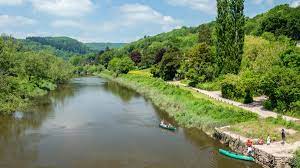England to diverge from EU water monitoring standards

London: The UK government is to diverge from the EU’s standards for monitoring water quality in England, it can be revealed.
Campaigners fear the change of approach could lead to more pollution in England’s rivers and waterways if the new measuring methods are less rigorous.
While in the EU, England was covered by the water framework directive (WFD), which meant a national chemical and ecological survey of rivers was conducted annually. After Brexit, the WFD was transposed into English law but the government removed the requirement to conduct annual tests.
This is the latest example of the UK diverging from EU environmental standards. Recent analysis found that many toxic chemicals and pesticides banned in the bloc since Brexit are not outlawed for use in the UK. Ministers have also sought to rip up EU-derived sewage pollution rules for housebuilders.
In 2019, the last time the full water assessments took place, just 14% of rivers were in good ecological health and none met standards for good chemical health. The government has said it does not intend to deliver a complete update until 2025, the latest permissible date under the new WFD.
The Guardian can reveal that the government will be using its own, as yet undisclosed methodology to assess river health. Activists say this may make it harder to compare the state of the country’s rivers against those in the EU, and will leave the public in the dark over pollution from sewage and agriculture.
Government officials met stakeholders to tell them about the change. A source from an NGO present in the meeting said: “When asked how this would affect assessments against the target set out in the government’s environment improvement plan, officials commented that this data would no longer be used for that purpose, and that Defra were looking to use the Natural Capital and Ecosystem Assessment (NCEA) process to assessment performance. I question how developed the work on the NCEA is and whether this is suitable.”
A spokesperson for the Environment Agency confirmed to the Guardian that WFD data would no longer be used for the assessments. They said: “A pioneering partnership between Defra, Natural England, Environment Agency, Forest Research and the Joint Nature Conservation Committee, NCEA blends capability, expertise and experience to build a richer, more comprehensive picture of our natural environment, monitoring quality and quantity, assessing the impact of or need for interventions and helping to manage and protect our natural capital.”
It is now unlikely that any data revealing whether or not the situation has improved since the 2019 study published in 2020, that shamed the government by showing no English river was in good chemical condition, will be published before the next general election.
Stuart Singleton-White, of the Angling Trust, said: “WFD has been the bedrock of us understanding the state of our rivers, lakes and groundwater. It does not give a full picture, but it does provide a useful starting point. Past assessments have shown things are getting worse, not better. To now not have a full assessment in 2022 and have to wait to 2025 … simply sows confusion and leaves the public in the dark when it comes to properly understanding whether our rivers are getting better or worse.”
Government officials told the stakeholder meeting that in 2022 only a limited number of water bodies were assessed due to the Covid-19 pandemic and budget cuts. They told those present that they would use other monitoring data to keep their assessments of water quality on track, but that they would not use the limited 2022 assessments to extrapolate to a national picture as this risked creating a bias in the data. The 2022 data showed that the condition of the sites assessed had worsened.
The Liberal Democrats’ environment spokesperson, Tim Farron, said: “Instead of clamping down on sewage dumping, ministers have let water companies off the hook and scaled back assessments so we could know exactly how much damage has been done. It is frankly a disgrace. The whole system needs a complete overhaul. That means abolishing Ofwat and setting up a new regulator with real teeth and ensuring that testing is carried out regularly so we can get a full picture of the damage being done to our countryside.”
An Environment Agency spokesperson said: “Improving water quality is one of our highest priorities. We work through plans established under the water environment regulations to guide our permitting and enforcement. This work must be driven by a clear evidence base and we are working with partners to provide better information to enable this, including more real-time data. The next comprehensive update of classifications in all water bodies will be 2025. No significant changes to the classification methodology are planned – including changes to one out, all out. Every single water body will receive a classification.”





